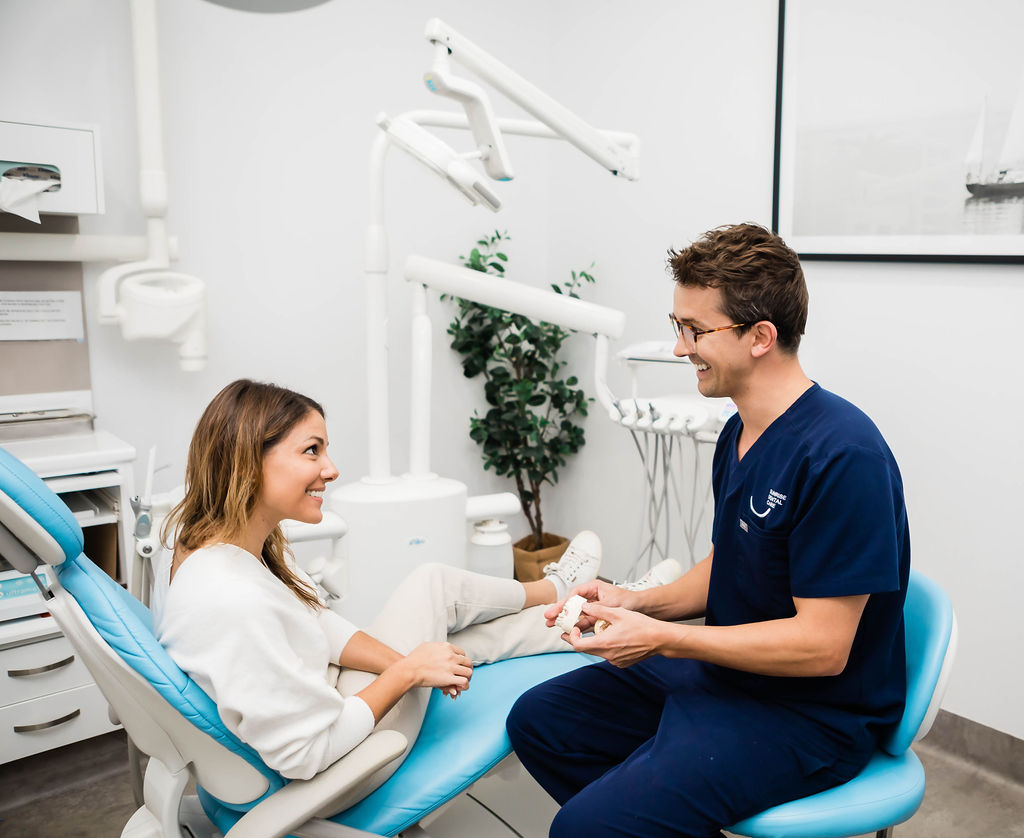
Clinic FAQs
The world health organisation (WHO) recommend to visit the dentist once every 6-months to assess the status of your oral health and to implement preventive measures.
Having regular, 6 monthly exams allows us to:
- Identify any potential issues while they are small and more easily manageable.
- Implement important preventative measures to help avoid potential issues and the need for expensive dental treatment down the track.
- Allows for professional cleaning. Plaque is one of main causes of dental decay and gum disease so it is important to have regular cleans where your tooth brush and floss my not get to ensure your mouth is healthy.
- Brush your teeth at least twice a day for 3-4 minutes with fluoride toothpaste.
- Replacing your toothbrush every three months.
- Floss once a day to clean in-between your teeth.
- Use a fluoride mouthwash.
- Eat a well-balanced diet with limited sugary foods between meals.
- Do not smoke.
- Visit your dentist every 6 months for regular examination and cleans.
Yes. We welcome new families and patients to our practice.
If you feel we have treated you well, the greatest compliment you could give is recommending us to a family member, friend or co-workers.
Yes. However, at a later stage we would ideally like to see you for an examination to assess your overall dental health.
Payment FAQs
We welcome QLD Health Dental Vouchers and bulk bill treatment under Dental Veterans Affairs (DVA), North Coast Aboriginal Corporation for Community Health (NCACCH) and The Child Dental Benefits Schedule (CBDS).
Yes, we accept all major health funds and have a hicap machine for simple and easy claiming. Sunrise Dental Care is a preferred provider for BUPA, HCF, NIB, GMHBA, Healthcare Insurance, PeopleCare, Australian Unity, TUH, Westfund and smile.com.au.
Yes, we use Openpay. To read more information on them please click the following link, or please call the practice to discuss.
Extraction FAQs
Yes, we perform all dental extractions including surgical removals.
Not necessarily. However, occasionally antibiotics are required if an infection has spread or caused you to feel unwell.
No. Your dentist will want to know what medication you are taking and the results of your most recent blood test. This will give an indication of the likelihood of excessive bleeding.
Bleeding after an extraction can easily be managed by suturing and/or packing the socket.
Yes. At Sunrise Dental Care we place dental implants. This procedure can be carried out with local anaesthetic for most patients. However If you are particular nervous about the treatment there are options for sedation or general anaesthetic.
Children FAQs
Yes. We strongly recommend starting regular dental appointments for children when they are young to implement simple preventative measures and eliminate fear.
Up until the age of one use a damp cloth and gently rub the teeth over to remove any build up. After the age of one you can begin using a child specific toothbrush. As soon as possible, it is advisable to encourage your child to brush their own teeth with adult supervision.
If your child will not cooperate with toothbrushing, it is best to sit them on your knees facing away from you, and then tip them back so you have easy access for toothbrushing. You can use one arm to control their movements, and the other for brushing. If your child cries, it may increase the ease of access! Once your child accepts that you will consistently make them have their teeth brushed, and will not back down, they will become more cooperative.
Generally around 11-12 years, this is when all the permanent teeth are present. There are some early interventions which will help with treatment later on and these are best identified around the age of 9. This is a good age to visit a dentist to have an Orthodontic assessment.
Dental FAQs
Yes. Treatment which will improve the appearance of your teeth may include teeth whitening, veneers, crowns; build ups with composite resin and reshaping.
There are many causes; the most common include ageing, tea, coffee, red wine and smoking.
Almost anyone can benefit from professional tooth whitening, it is safe and effective way to cosmetically improve your smile. Whiter teeth can boost your self-esteem and confidence. Generally, those individuals with healthy, sound teeth respond best.
However, teeth whitening is not recommended for anyone under the age of 16 and for pregnant or lactating women.
Research and clinical studies have proven that tooth whitening under the supervision of a dentist is safe for teeth and gums. In some instances, you may experience mild sensitivity.
A small amount of enamel is reduced from the front surface of the tooth. Impressions are taken, and the colour of the tooth is matched. The porcelain veneers are then constructed in the laboratory and then bonded to the teeth.
Gum disease (or Periodontitis) can often be present with no symptoms. Your dentist will measure for gum pockets, movement of the teeth and bleeding of your gums. These measurements, plus any necessary x-rays can give you a diagnosis of the extent of gum disease. Some patients may notice bad breath, bleeding on cleaning or eating, or a visible lengthening of the teeth with dark spaces opening between the teeth.
When the nerve of the tooth is absent, the tooth becomes brittle and you lose the feedback when biting where your brain receive signals about the amount of force being applied to a tooth. This leads to a much higher risk of breaking a root filled tooth. The purpose of a crown is to prevent the tooth breaking or splitting and its also an ideal way to ‘seal’ the root-filling from the bacteria in the mouth.
Yes, medications can have oral side effects – dry mouth being the most common.
Antihistamines, Decongestants, Pain Killers, Diuretics, Blood Pressure Medications and Antidepressants can all produce dry mouth.
Other medications may cause abnormal bleeding when brushing or flossing, inflamed or ulcerated tissues, mouth burning, numbness or tingling, movement disorders and taste alteration. If you experience any of these symptoms, consult your dentist or physician.
Emergency FAQs
Dental emergencies can occur at any time and for a variety of reasons eg.pain, infection, swelling, trauma and bleeding
In the case of emergency, please call sunrise dental care on 54554511 so we can assist you immediately. However, If your condition requires urgent medical attention, please visit your local hospital’s emergency department.
Yes. Dental emergencies requires immediate attention. For this purpose, at sunrise dental, we reserve daily appointments to see emergency cases.
A permanent adult tooth that has been knocked out can sometimes be put back in position by a dental professional.
Time is critical. Handle the tooth only by the crown, store in milk and if bleeding apply direct pressure to the site using gauze or a clean handkerchief.
- The tooth needs to be re-implanted into its socket immediately.
- Try not to handle the tooth root to protect the fibres around the root surface.
- If possible, place the tooth back into the socket.
- DO NOT place the tooth in water.
- DO place the tooth in cold milk or on one side of your mouth between your teeth and cheeks, this protects the ligament.
- Contact us immediately
We accept all major health funds and are preferred providers for:








